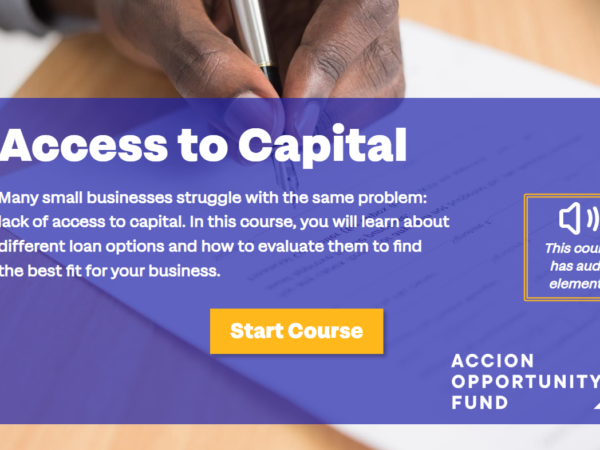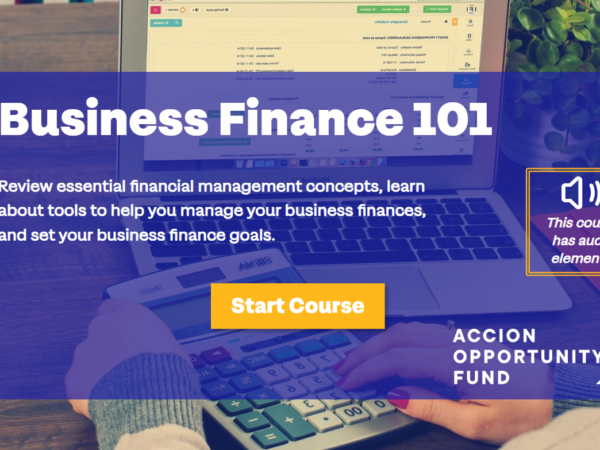Angel Investors and Venture Capitalists for Your Small Business
Learn how to attract angel investors and venture capitalists to your small business and receive practical advice and actionable steps.

Are you a small business owner looking to raise funds from angel investors or venture capitalists, but feeling overwhelmed or intimidated by the process? You’re not alone! This resource is designed for entrepreneurs who are new to the world of funding and need guidance on how to get started. Expert speakers provide a high-level overview of how to pitch to investors, what to expect during the fundraising process, and where to find potential investors. They break down complex concepts into easily understandable terms and provide practical tips for creating a successful pitch and navigating the due diligence process.
Learn what it takes to attract angel investors and venture capitalists to your small business, receive practical advice and actionable steps to help you succeed, and determine if seeking funding from angel investors or venture capitalists is the right move for your business.
Meet the Experts
Deanna Hamilton
A serial entrepreneur and accredited investor, Deanna Hamilton is Founder and CEO of Circle One, Inc. After the successful launch of her award-winning consumer product marketing and multi-format printing company, which saw a historic acquisition and exit in 2012, Deanna’s passion for the art of the deal influenced her to re-organize Circle One, Inc. as a holding company. With a wealth of experience from Fortune 1000 companies, Deanna boasts an impressive academic background with a dual Master’s in Finance & Business Management. She also holds influential positions on several boards, such as the Fearless Foundation and the Silence the Shame Foundation. Her exemplary contributions to business and community service have earned her numerous accolades, including awards from the National Black MBA Association and Diversity Magazine’s Top 50 under 50 Corporate Executives.
Sam Sugarman
Sam Sugarman is an Associate at Fearless Fund, focusing on investment due diligence, supporting portfolio companies, and co-managing Fearless Fund’s fundraising efforts. Sam spent two years in investment banking across healthcare and restructuring sectors as well as two years in private equity fund and co-investing at Hamilton Lane. Prior to these experiences, Sam completed internships in venture capital, investment banking, at Fortune 500 companies and at startup technology companies. Sam attended Brandeis University and majored in Economics and Psychology.
What is equity investment and how does it work?
There are three main ways to fund a business: grant funding, debt funding, and equity funding.
Grant funding is a type of capital that you don’t have to pay back and that doesn’t take a share of your business ownership. There are many different types of small business grant programs, including some offered by AOF.
Debt funding is a type of financing that you do have to pay back, often with interest, like a traditional loan.
Equity funding is a type of financing that you don’t have to pay back directly, but in exchange for providing capital to your business, you give the funder partial ownership (including shares of profit) of your business. Withing equity funding, there are two main types of funders: Angel Investors and Venture Capitalists (VCs)
- Angel Investors: Typically invest in businesses in the early stages with checks of $10,000-100,000 in exchange for equity or partial ownership. Angel investors invest their own money into businesses.
- Venture Capitalists: VCs manage funds of money provided by individuals and institutions. Using these funds, VCs invest in more established businesses looking to grow. They typically invest $100,000-500,000 (or more) in exchange for equity or partial ownership.
Both angel investors and venture capitalists expect a monetary return on their investment in your business.
Types of Equity Investments
- Pre-seed: This is the first institutional round of funding that a company will raise. This is typically for businesses that have a team and a proto-type product that is close to being finalized and going to market.
- Seed: This funding typically comes when you are already generating revenue and you are selling your product on the market. Seed funding is often used by businesses who are ready to grow their market share.
- Series A: This type of equity investment is for very well established businesses. Typically these businesses are generating tens of millions of dollars in revenue each year. Series A funding is typically used to help established businesses grow very quickly.
How much ownership do investors typically take?
The amount is negotiable with your particular investor. It depends on the amount of money they are investing in your business relative to the amount of revenue you are generating. Anything from 10-30% ownership share is standard for investors. Experts recommend a sweet spot of 15-20% ownership share.
What do angel investors and venture capitalists look for in a small business?
- Market Potential: How competitive is the market?
- Market Traction: How much share or traction does your product have (or potentially have) in the market?
- Financial Stability: Is the company making money? How much and how regularly?
- Growth Potential: How likely is it that your business could grow and scale? How successful is the business likely to become?
- Customer Base: Does the business have a robust and well established customer base?
- Intellectual Property: Does the business have unique, protected intellectual property such as a copyright, trade secret, trademark, or patent?
- Business Plan: Does the business have a solid and regularly updated business plan with a clear path for growth?
- Team: Do you have a strong team? Do they have relevant experience?
- Exit Strategy: Do you have a clear exit strategy that you are working towards?
- Development Roadmap: What is your plan for developing new lines of business (features, products, or services) over the next year or more?
How do you find potential angel investors or venture capitalists?
When you are just getting started, it can feel very difficult to find an angel investor or VC who wants to invest in your business. Experts recommend starting with the following resources:
- Incubators and accelerators like the New Voices Foundation and Fearless Fund can be a good place to start . Take advantage of pitch competitions, like Tech Stars. Many times the judges are investors themselves.
- Crowdfunding platforms like Start Engine
- Local universities, many of whom have entrepreneurship centers
- Local groups that a focus on entrepreneurship generally
Pro tip: Reach out to many different organizations to determine if they are the right fit for your needs. Even if they aren’t the right fit, ask them if they can point you to a person or organization who is the right fit. Most organizations are happy to make an introduction.
What is the due diligence process like?
Every potential investor goes through the due diligence process differently. As part of the due diligence process, investors are working to determine if your business is a good fit for their investment and expertise. They want to understand the risks that might be involved in investing in your business. Potential investors will typically review your financial documents, business plan, legal documents, and product information.
What are the dos and don’ts of negotiating with angel investors and venture capitalists?
- Do go in to negotiation understanding the needs of the other side of the table. Understand that the investor is typically there to make money.
- Do be confident. Know the value of your business and your products.
- Don’t be over-confident. Negotiation is a two way street, so it is best to go into the experience ready to learn, understand and compromise.
- Do use the power of “no”. Not every deal is the best deal. Don’t be too desperate to make a deal. Be willing to walk away if the deal isn’t right.
- Don’t make emotional decisions. We know that business owners are often personally attached to their business, which can make it difficult to remove emotion from business decisions. Listen to you gut, but try to make your decisions using logic, not emotions, when negotiating with potential investors.
- Do seek legal and financial advice before you negotiate. All legal paperwork needs to be reviewed by attorneys. The more you know going into a negotiation, the better off you will be in the long term.
How can we prepare our business for future funding opportunities?
It’s ok if you aren’t ready for investor funding now. If that is your goal, there are steps you can take to prepare your business for future investor funding opportunities.
- Make sure you have a strong business plan. It’s great to be passionate about your business, but it’s also important to have a formal plan to guide your business in the long term.
- Build a strong team and develop your organization. Have the right people in place to help your business grow. Ensure that team members have the experience and skills necessary to support and guide the business as it grows.
- Understand the value of your business. Know what your business is worth so you can go into a negotiation with a strong base.
- Develop a strong customer base. Investors want to see that your business is currently successful and is likely to continue to be successful over the long term. A strong customer base is a key way to evaluate business success.
- Build market awareness. Tap into your target market and show awareness of potential changes to the market. Be ready to adapt to changes in the market as they happen.
- Demonstrate that your business is actually scalable. Have a robust growth or business plan in place demonstrating how your business can scale.
- Maintain a demonstrated, documented record of success. Make sure you have the documentation to back up your past success, including financial statements, new product launches, and sales data.
- Protect your intellectual property. If your business has something novel and unique that makes it successful, make sure that your intellectual property is legally protected.
- Make an exit strategy. When you start you business, you have to begin with the end in mind to build a successful business strategy. What is the end goal of that business for you? Do you want to sell it? Do you want to take it public? Do you want to sustain it? You need to know where you are going so you can work towards those goals.
- Grow your board of advisors. Make sure you have a team in place to help your business succeed.
What are investors evaluating during a pitch?
When you are pitching your business to investors, they are typically looking to understand:
- What is your product and business model?
- What need is your product solving in the market?
- How big is the market opportunity?
- Who else is addressing this need in the market? Who is the competition?
- How is your product or service different from the competition?
- Is your business sustainable?
- Why should a potential investor trust you and your team?
Want to learn more about how to pitch your business? Check out this short, interactive course on Pitching Your Business.









